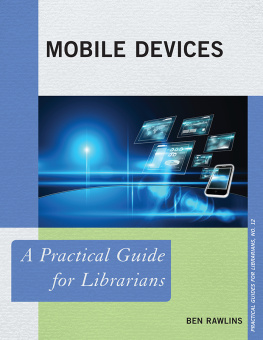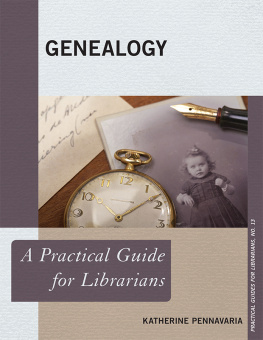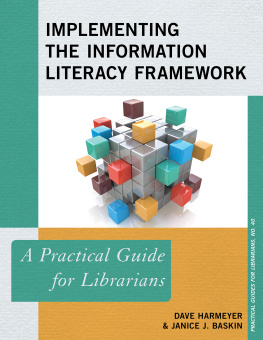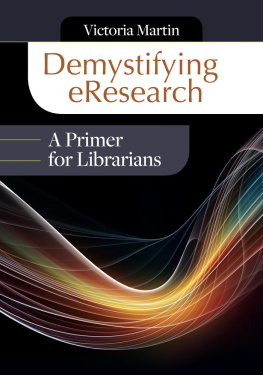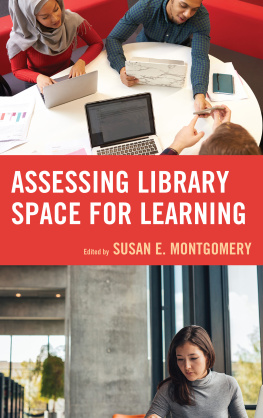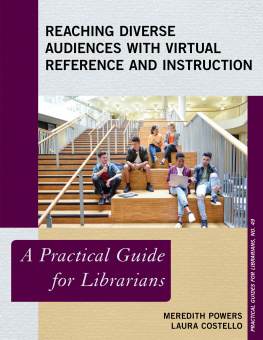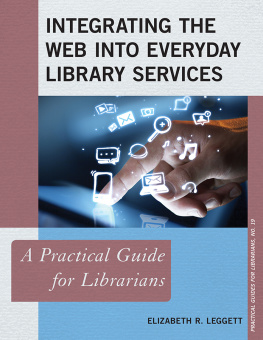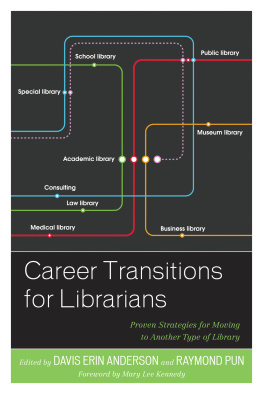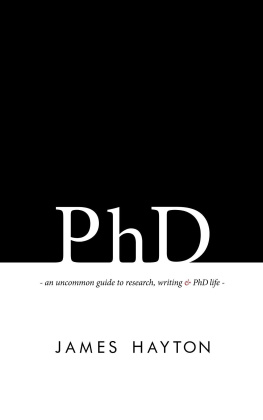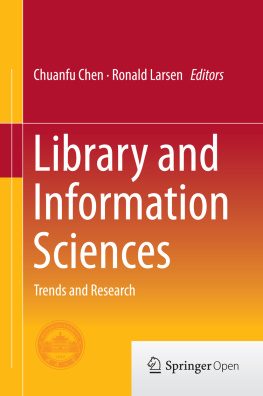ENHANCING LIBRARY AND INFORMATION RESEARCH SKILLS
A Guide for Academic Librarians
Lili Luo, Kristine R. Brancolini, and Marie R. Kennedy

Copyright 2017 Lili Luo, Kristine R. Brancolini, and Marie R. Kennedy
All rights reserved. No part of this publication may be reproduced, stored in a retrieval system, or transmitted, in any form or by any means, electronic, mechanical, photocopying, recording, or otherwise, except for the inclusion of brief quotations in a review, without prior permission in writing from the publisher.
Library of Congress Cataloging-in-Publication Data
Names: Luo, Lili (Professor of library and information science), author. | Brancolini, Kristine R., author. | Kennedy, Marie R., author.
Title: Enhancing library and information research skills : a guide for academic librarians / Lili Luo, Kristine R. Brancolini, and Marie R. Kennedy.
Description: Santa Barbara, California : Libraries Unlimited, [2017] | Includes bibliographical references and index.
Identifiers: LCCN 2017039186 (print) | LCCN 2017020281 (ebook) | ISBN 9781440841736 (ebook) | ISBN 9781440841729 (paperback : acid-free paper)
Subjects: LCSH: Library scienceResearch. | Information scienceResearch. | Academic librariansTraining of. | ResearchMethodologyStudy and teaching (Continuing education) | Library education (Continuing education) | Evidence-based library science.
Classification: LCC Z669.7 (print) | LCC Z669.7 .L86 2017 (ebook) | DDC 020.72dc23
LC record available at https://lccn.loc.gov/2017039186
ISBN: 978-1-4408-4172-9
EISBN: 978-1-4408-4173-6
21 20 19 18 17 1 2 3 4 5
This book is also available as an eBook.
Libraries Unlimited
An Imprint of ABC-CLIO, LLC
ABC-CLIO, LLC
130 Cremona Drive, P.O. Box 1911
Santa Barbara, California 93116-1911
www.abc-clio.com
This book is printed on acid-free paper 
Manufactured in the United States of America
Contents
Foreword
I gained a new community of librarian-researchers as a scholar in the inaugural 2014 Institute for Research Design in Librarianship (IRDL). As part of this cohort, I struggled, learned, questioned, unpacked, reflected, and engaged the world of social science research design and research methods. Indeed, along with my fellow IRDL scholars, the struggle to wrap our minds around qualitative, quantitative, and mixed-methods research would not have been as much fun or memorable without our peer learning, and the camaraderie that came with it. I breathed in that magic dust of excitement at Loyola Marymount University, which hosted the nine-day institute on research design.
When I was asked to write this Foreword, I looked back on that experience. Armed with new knowledge, I went back to my institution, ready to run with my project, going head first into the crush of teaching, collection development, and the glory of unjamming printers. Being a librarian who is also a researcher-practitioner, the year that followed IRDL was a blur, and it helped to have Marie and Kris during monthly check-ins to share solutions around common problems that information professionals face when running a project in our organizations. With the help of the IRDL community, I got my project done, analyzing and reanalyzing the data for local, national, and international conferences. Without hesitation, I can say that I grew in my skills to run a research project, ethically collecting patron data at my library, and the ball hasnt stopped rolling, as I am now involved in several projects that wouldnt have been possible without the initial support from IRDL.
Research is not easy, and getting actionable quality data for libraries as organizations requires discussion, reflection, time, resources, and both knowledgeable and supportive peers. In this book, Lili, Kris, and Marie distill hard-won lessons from the IRDL experience, based on the past three years working with 64 IRDL scholars, enthusiastically listening and advising them on projects at a wide variety of institutional settings. For the academic librarian reader, this book features the core skills of that singular IRDL experience created by the authors. It will be a great starting place for librarians who are new to institutional review boards and the process around advocating and obtaining research support; it includes chapters that counsel the reader with approaches to planning, collecting data, and disseminating results for assessment, evaluation, and innovation. Having been there from the beginning of IRDL and watched the authors engage with two additional years of cohorts, I cannot think of any other authors who are so uniquely qualified to write a book about research design for librarian-researchers.
Frans Albarillo
Reference and Instruction Librarian
Brooklyn College
City University of New York
Academic Librarians as Researchers
Research begins with questions. If you are reading this book, you are likely already thinking about questions you would like to answer. Or you may have planned a research project with which you would like to get started. In this chapter, you are encouraged to organize your thoughts and to challenge yourself to begin. This chapter defines research and describes the kinds of research the entire book guides you to complete. You will also be introduced to trends and patterns in academic librarian research, including authorship, published topics, article types, research design, and methods.
The objectives of this chapter include:
- Understanding the role of research in academic librarianship
- Understanding the scope and structure of the book and how to use it to enrich your knowledge of the research process
WHY ACADEMIC LIBRARIANS SHOULD CONDUCT RESEARCH
Your questions are valuable. A profession like librarianship moves forward only as far as its members are willing to push it. You are moving it forward by reflecting on the way things are typically done, noticing gaps that other people may not seeor may not have tackledand imagining improvements in all areas of the library. As an academic librarian, it is your questioning that aligns the library with the mission of your institutions, situating yourself as part of the academy, a culture of examination and deep thought.
The reasons for academic librarians to conduct research are varied and well-argued: It can promote strong relationships with teaching faculty, enhance beneficial comprehension of the research process, and facilitate concrete understanding of the access and service needs of the library clientele (Black & Leysen, 1994, p. 230); [c]onducting research can contribute to career advancement for librarians, especially academic librarians on tenure track (Powell, Baker, & Mika, 2002, p. 49); [l]ooking analytically at librarianship through research fosters growth, curiosity, awareness and promotes new learning (Crumley & Koufogiannakis, 2002, p. 62); and [e]ffective interaction between research and practice will produce a strong theoretical framework within which a practitioner community can develop and thrive (Haddow & Klobas, 2004, p. 30), to cite only four examples. Accreditation bodies require that academic institutions engage in assessment and evidence-based decision making. Thus, it has become very important for libraries to study their own operations in a systematic and reliable manner.
In the published literature, some authors express a sense of urgency about the research design training received by librarians. OConnor and Park (2001) comment that, Our field needs to educate a large number of producers of research if we are to maintain a stable infrastructure for our research base (p. 104). This book attempts to address that urgency by providing the essential information you will need to know to produce your own reliable research.
Next page

